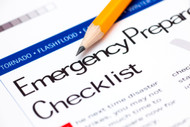What Is National Preparedness Month?
Posted by admin on Sep 1st 2021
September of each year is designated as National Preparedness Month, a month devoted to education and awareness of disasters and emergencies. But what exactly does National Preparedness Month mean? What is its purpose and history?
National Preparedness Month was created in 2004 in the United States by the Federal Emergency Management Agency (FEMA) to encourage Americans to be prepared for emergencies in their homes, businesses, schools, and communities. The month of September was selected for National Preparedness Month not only because it marks the peak of the Atlantic coast hurricane season, but also because it serves as a reminder of the September 11, 2001 World Trade Center terrorist attack. In this way, FEMA hopes that this month encourages people to be prepared not just for natural disasters like tornadoes, fires, and floods, but also against human-created hazards like terrorist attacks.
National Preparedness Month is designed to encourage individuals, families, and businesses to prepare for unforeseen disasters.

For individuals and families, the goals are:
- to have emergency supplies available
- to have plans ready for future emergencies
- to become better informed about different emergency situations
- to gain the training to deal with emergencies in the household and surrounding community

For businesses and organizations, the goals are:
- to develop plans to stay actively in business after emergencies
- to educate and inform the members of the business or organization regarding emergency procedures
- to document and keep records of property and equipment
- to back up business-critical information
- to have a response team ready for future emergencies
Each year, National Preparedness Month features a specific theme. The theme for September 2021 is “Prepare to Protect. Preparing for disasters is protecting everyone you love.” Each week in September also has its own theme, enabling people to learn specific aspects of emergency preparedness incrementally.

The weekly themes for September 2021 are:
- Make a Plan: Discuss with friends and family how to continue communication before, during, and after a disaster.
- Build a Kit: Gather several days’ worth of non-perishable or long-lasting supplies for everyone in the home. Consider each person’s specific needs, such as any medications, foods, or other materials. Make sure to gather supplies for any pets in the household, as well as any supplies needed to evacuate the house if necessary.
- Low-Cost, No-Cost Preparedness: Learn about potential disasters that can occur in the area, such as hurricanes or floods in coastal regions. Prepare for such by learning how to strengthen the home against these specific disasters. Check up on your insurance coverage to make sure it is current for your needs.
- Teach Youth About Preparedness: Talk to your children about their roles and expectations during a disaster. Teach them what to do both with the family and in cases where they are separated from other family members. Teach them ways they can get involved in emergency preparations.

National Preparedness Month is intended to encourage everyone to do what they can to be prepared, but it does not mean that you need to take drastic measures or make huge lifestyle changes to be prepared. It simply means educating yourself and having some useful household emergency supplies available. Being prepared can be as simple as having a stocked first aid kit on hand for injuries, or a Multipure drinking water system or WET (Water Emergency Treatment) system available for clean drinking water. Being prepared means knowing how to act during and after an emergency.
Learning about National Preparedness Month and teaching your children and family about it is a great first step toward preparing your home for unforeseen disasters. Learn together with your family as much as you can about potential disaster situations in your local area, and make it a family activity to prepare each other and your home for emergencies. With enough knowledge and preparation, you can help mitigate the damage that occurs during and after disaster strikes, and help ensure that you and your family will be ready to recover and rebuild.
References
- “National Preparedness Month.” Ready.gov. August 26, 2021. https://www.ready.gov/september
- “National Preparedness Month.” Wikipedia. April 14, 2020. https://en.wikipedia.org/wiki/National_Preparedness_Month
- “September Is National Preparedness Month.” National Weather Service. Last accessed August 26, 2021. https://www.weather.gov/bmx/outreach_npm
- “September Is National Preparedness Month.” Ready.gov. September 2019. https://community.fema.gov/story/September-is-National-Preparedness-Month?lang=en_US
- “September Is Preparedness Month.” EPA. Last accessed August 26, 2021. https://www.epa.gov/natural-disasters/september-preparedness-month

